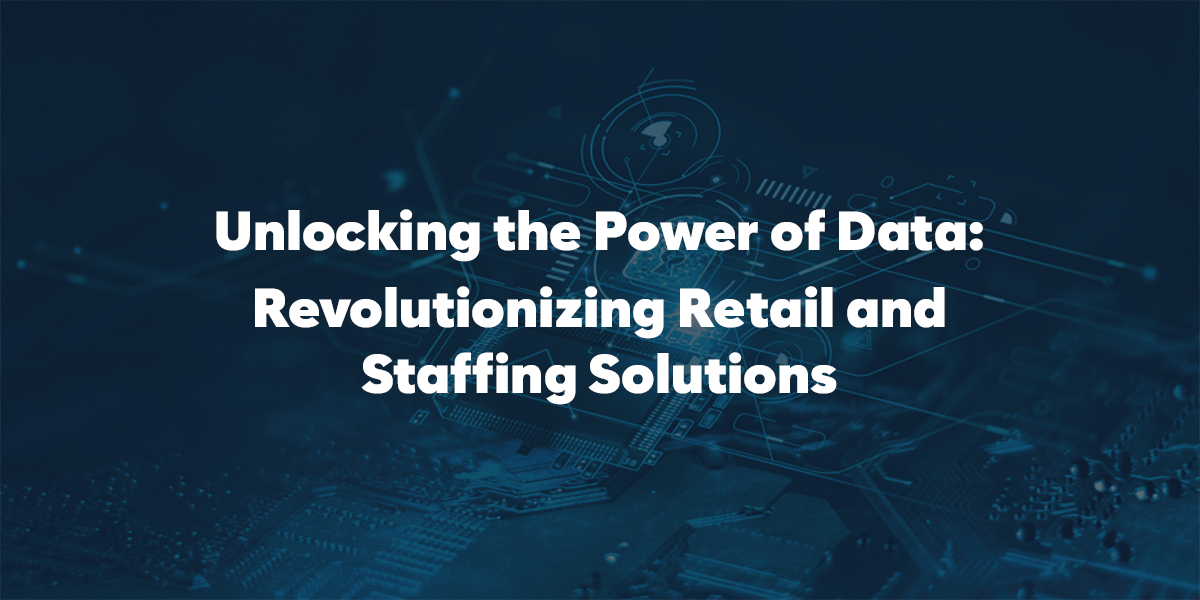In today’s rapidly evolving business landscape, data has become the cornerstone of success, transforming industries, and reshaping traditional business models. One sector where this transformation is particularly evident is the retail and staffing industry. Harnessing the power of data has proven to be a game-changer. It is enabling businesses to optimize operations, enhance customer experiences, and streamline staffing processes.
In this blog post, we will explore how data is revolutionizing retail and staffing solutions, unlocking unprecedented opportunities for growth and efficiency.
Personalized Shopping Experiences
One of the significant ways data is revolutionizing retail is through personalized shopping experiences. Retailers now have access to vast amounts of customer data, from purchase histories to browsing behaviors. Analyzing this data allows businesses to tailor their offerings to individual preferences, creating a more personalized and engaging shopping experience.
For example, online retailers leverage data to recommend products based on a customer’s previous purchases or items they have shown interest in. This not only increases the likelihood of a sale but also enhances customer satisfaction, fostering brand loyalty.
Inventory Optimization
Data analytics has also revolutionized inventory management in the retail sector. By analysing historical sales data and real-time market trends, businesses can optimize their inventory levels. Thereby, reducing carrying costs and minimizing the risk of stockouts. This not only improves overall operational efficiency but also ensures that customers find the products they need when they want them.
Predictive Analytics for Workforce Management
Data-driven insights are reshaping the way businesses approach workforce management. Predictive analytics, powered by data, allows businesses to forecast their staffing needs accurately. By analyzing historical data on customer footfall, sales patterns, and other relevant factors, businesses can optimize their staffing levels to meet demand without overburdening the budget.
For instance, during peak shopping seasons, retailers can use historical data to predict the busiest times and schedule additional staff accordingly. This ensures a seamless shopping experience for customers and enables businesses to maximize sales opportunities.
Talent Acquisition and Retention
In the staffing industry, data plays a crucial role in talent acquisition and retention. Recruitment processes are being revolutionized using data analytics, enabling businesses to identify and attract candidates with the right skills and cultural fit. Additionally, by analyzing employee performance and satisfaction data, companies can implement strategies to retain top talent, reducing turnover costs.
Optimizing the Supply Chain
The supply chain is the backbone of the retail industry, and data is transforming the way it operates. By using technologies like the Internet of Things (IoT) and advanced analytics, businesses can gain real-time visibility into their supply chain processes. This visibility enables proactive decision-making, helping companies identify and address potential bottlenecks before they impact operations.
For example, sensors on shipping containers can provide data on the location and condition of goods in transit, allowing retailers to track inventory in real-time and ensure the timely delivery of products to stores.
Efficient Checkout Processes
Data is also revolutionizing the checkout experience for customers. The implementation of technologies such as RFID (Radio-Frequency Identification) and mobile payment systems has streamlined the checkout process. Moreover, they reduce waiting times and improve overall customer satisfaction. Through data analytics, retailers can gain insights into customer purchasing patterns. Thus, allowing them to optimize checkout layouts and staffing to minimize queues during peak hours.
Protecting Customer Data
As businesses increasingly rely on data for decision-making, the importance of cybersecurity cannot be overstated. Retailers handle vast amounts of sensitive customer information, from personal details to payment data. Data breaches can have severe consequences for both customers and businesses, eroding trust and damaging reputations.
Implementing robust cybersecurity measures is essential to safeguard customer data. Encryption, multi-factor authentication, and regular security audits are just a few strategies that businesses can employ to protect against cyber threats.
Conclusion: Embracing a Data-Driven Future
The revolution in retail and staffing solutions fuelled by data is just the beginning of a broader transformation across industries. Businesses that embrace and harness the power of data are better positioned to thrive in an increasingly competitive and dynamic environment. From providing personalized shopping experiences to optimizing staffing levels and streamlining operations, data-driven strategies are unlocking new possibilities and reshaping the future of retail and staffing.
As we move forward, the ability to leverage data effectively will be a key determinant of success in these rapidly evolving industries.




